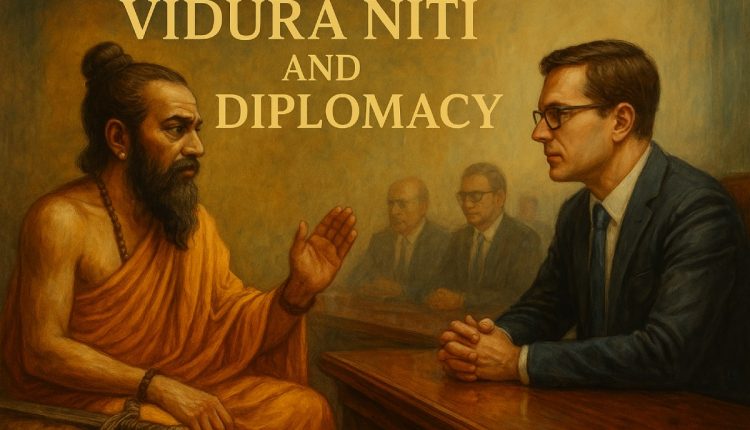Vidura Niti Based on the teachings of Vidura, the intelligent minister of Hastinapur, this text offers an invaluable guide to the nuanced and often difficult to grasp nuances of politics and statecraft contained in the Mahabharata. His counsel to King Dhritarashtra extends beyond mere kingdom rule to effective recognition and anticipation of elements of people, resources and management of crises opener. And these are the values that still matter a great deal in today’s corporate leadership climate when strategy, diplomacy and moral leadership drive one’s success. Focusing on one verse that is a distillation of Vidura’s timeless wisdom, let us explore now how it might enlighten corporate craft today.
Attention is also paid to the balance of leadership energies as per Vidura teachings. He advises leaders to be empathetic but tough, decisive but willing to take advice. Vidura says that the knowledge of friends and foes, judicious allocation of treasury and maintain patrons’ faith, are crucial factors for a kingdom’s welfare. It is easy to use these principles in business. In a king-like manner, a CEO has to handle the delicate relationships with various stakeholders, rivals and employees, and ensure the organization grows and maintains its stability.
Diplomacy is a fundamental strategy of Vidura. He advises leaders to avoid unnecessary disputes while cultivating alliances through strategic negotiation and mutual benefit. Business approaches require the development of partnerships and the resolution of disputes through peaceful methods. Businesses gain more benefits from joint cooperative projects than through aggressive competition when pursuing market share. Vidura teaches that rivals can transform into allies when leaders use conciliatory strategies to win over enemies.
Resource management is another important lesson. Vidura encourages preparedness measures like grain stockpiling for difficult periods and warns about spending money without need. Responsible financial planning in business operations involves maintaining sufficient cash reserves alongside investment in innovation and avoiding reckless expansion. Companies that prepare strategically like Apple and Toyota survive economic downturns, while firms that grow excessively during prosperous times often collapse when markets recede.
According to Vidura ethical governance stands as a crucial principle. According to his teachings, a leader will forfeit his subjects’ loyalty if he rules unjustly or exploits them. Executives who prioritize profits over customer loyalty and employee well-being face the potential of long-term business failure. The collapse of Enron along with other similar scandals reveals the disastrous consequences of ignoring ethical principles. Patagonia maintains long-lasting customer loyalty and trust because of their commitment to balancing financial success with social responsibility.
Vidura Niti’s Chapter 33 Shloka 68 contains a pivotal verse that encapsulates this wisdom.
“Na tathā śaktiḥ śastrasya yathā śaktiḥ samādhitaḥ”
Conciliation wields more influence than any weapon ever could.
This verse emphasises the superiority of diplomacy over force. It serves as a reminder to leaders in the business world that understanding and negotiation frequently yield greater results than forceful methods. A stronger, more cohesive workplace is created when a manager uses dialogue rather than threats to settle team disputes.
Vidura’s ideas are remarkably applicable today. Global competition, workforce diversity, and rapid technological change are some of the issues that corporate leaders must deal with. Navigating global marketplaces, where cultural sensitivity can make or break deals, is made easier with diplomacy. Companies can adjust to disruptions like artificial intelligence or climate regulations thanks to strategic planning. As demonstrated by companies like Unilever, which prosper by striking a balance between profit and purpose, ethical leadership creates brands that last.
Nevertheless, there are difficulties in putting Vidura’s wisdom into practice. In contrast to Vidura’s demand for foresight, modern corporations frequently put short-term gains ahead of long-term stability. Diplomacy or ethics may be overshadowed by the pressure to produce results quickly. However, leaders who adopt Vidura’s well-rounded strategy—which combines tact, preparation, and integrity—build organisations that inspire as well as endure.
Vidura Niti provides a profound and useful corporate craft blueprint in a world of fierce competition. It teaches us that building trust, not just wealth, and winning hearts, not just battles, are the hallmarks of true leadership. The ancient voice of Vidura whispers a straightforward truth as businesses look to make an impression in a complex world: lead with wisdom, and success will follow.
Where swords fail, conciliation prevails in the boardroom, just as it does in the kingdom.


Comments are closed.